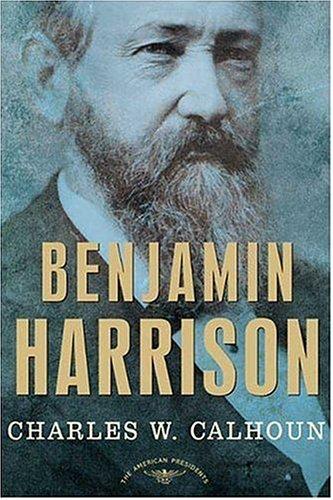Benjamin Harrison
The latest in my ongoing effort to study America through the lens of presidential biographies, Charles W. Calhoun's Benjamin Harrison manages the amazing act of being as informative as a Wikipedia article without actually revealing all that much about its subject. This may be a result of the scope of the book - it's part of The American President's Series, edited by Arthur M. Schlessinger Jr, and it's probable that the author was working towards a specific word count. But whatever the reason, this is hardly the most comprehensive look at the life of the 23rd President (that honor resides with the 3 volume opus by Harry J. Sievers). This isn't necessarily a bad thing; but the book succeeds in revealing very little about Benjamin Harrison himself. This is a political biography, focused entirely on Harrison's professional actions, rather then his personal life. This sadly contradicts the aim of the American President series which, according to Mr. Schlessinger is to remind us of the humanity behind America's leaders.
A book that concentrates on Harrison's personal life might prove in drumming up some interest in the man, who is largely forgotten when it comes time to discuss America's presidents. Harrison's political life was the usual domestic arguments over the tarrif, pensions, patronage and the economy, with a few international disputes to give the whole thing a little spice. But there are hints of a Greek drama going on behind the scenes: Harrison struck up a long friendship with his wife's neice, Mary Scott "Mame" Dimmick, such that she was eventually brought to the White House and was so trusted that she knew the government ciphers. His many surviving letters to her speak to a deep friendship and he continually sent her invitations and confided in her his professional concerns. All this might just be an echo of the Chester Arthur - Julia Sand relationship, if not for the fact that Harrison married his Mame in 1896, four years after the death of Harrison's first wife.
Mr. Calhoun doesn't let himself delve too deeply into this relationship, although this may be because he discounts the implications that there was a long, secret affair (platonic or otherwise). The question was certainly raised by Harrison's daughter, Mary, and her husband Robert McKee. They detested Mame and Robert seems to have suggested that the relationship was at best thoroughly improper. In any case, after the marriage, Harrison became estranged from his daughter and the two rarely, if ever, spoke. Marrying your wife's neice certainly isn't illegal, but it does fall into a murky moral terrain and the various questions about what really lay at the heart of Harrison and Mame (pun intended) is by far the most intriguing thing about him.
As mentioned, Mr. Calhoun doesn't go too deeply into any of this; much of this book is a survey of Harrison's accomplishments during his single term in office. There's about as much information here as there is in Alyn Brodsky's book on Grover Cleveland, another book which tries to demonstrate a man's forgotten contributions of the man to the evolution of American politics. Brodsky was pretty convincing in his portrayals, but then his book was also larger in scope. He was much more excited about his subject and the age in which he lived; Mr. Calhoun knows a lot about Harrison, but I never got the feeling that the man had inflamed his passion. It may be that there's a book out there that proves Harrison wasn't a caretaker president - but I'm not sure this one is it.
Related Books:
"Robert Todd Lincoln: A Man in his Own Right" by John Groff
"Dark Hourse: The Surprise Election and Political Murder of James Garfield" by Kenneth Ackerman
"Gentleman Boss: The Life of Chester A. Arthur" by Thomas Reeves
"Grover Cleveland: A Study in Character" by Alyn Brodsky

No comments:
Post a Comment